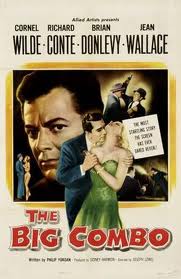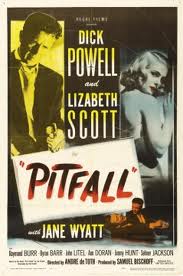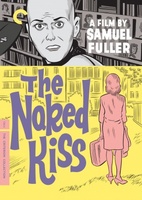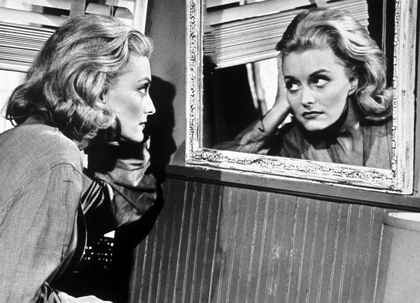 Now that “The Artist” won the Oscar for Best Picture, I’m hoping more people will feel inspired to explore black and white movies, especially Billy Wilder b&w flicks. (“The Artist” director Michel Hazanavicius thanked Wilder three times last night!) Overall, I enjoyed the show, though there were few surprises. Billy Crystal is always good and my favorite look of the night was Gwyneth Paltrow in the Tom Ford cape gown.
Now that “The Artist” won the Oscar for Best Picture, I’m hoping more people will feel inspired to explore black and white movies, especially Billy Wilder b&w flicks. (“The Artist” director Michel Hazanavicius thanked Wilder three times last night!) Overall, I enjoyed the show, though there were few surprises. Billy Crystal is always good and my favorite look of the night was Gwyneth Paltrow in the Tom Ford cape gown.
On the radar: ‘The Artist’ and inspiration; ‘Chinatown’ kicks off series; long gone Hollywood; Crawford goes a little crazy
 Now that “The Artist” won the Oscar for Best Picture, I’m hoping more people will feel inspired to explore black and white movies, especially Billy Wilder b&w flicks. (“The Artist” director Michel Hazanavicius thanked Wilder three times last night!) Overall, I enjoyed the show, though there were few surprises. Billy Crystal is always good and my favorite look of the night was Gwyneth Paltrow in the Tom Ford cape gown.
Now that “The Artist” won the Oscar for Best Picture, I’m hoping more people will feel inspired to explore black and white movies, especially Billy Wilder b&w flicks. (“The Artist” director Michel Hazanavicius thanked Wilder three times last night!) Overall, I enjoyed the show, though there were few surprises. Billy Crystal is always good and my favorite look of the night was Gwyneth Paltrow in the Tom Ford cape gown.
‘The Big Combo’ and ‘Pitfall’ to screen in downtown LA
 The Million Dollar Theater in downtown Los Angeles will show two classics of film noir on Wednesday night.
The Million Dollar Theater in downtown Los Angeles will show two classics of film noir on Wednesday night.
“The Big Combo” (1955) by Joseph H. Lewis
Cornel Wilde plays Police Lt. Leonard Diamond, a cop on a mission to nail a badass gangster (Richard Conte). Jean Wallace (Wilde’s real-life wife) plays the woman they both love. Lewis, the auteur of “Gun Crazy,” directed. Noir master John Alton (“T-Men”) was the cinematographer and David Raksin (“Laura”) composed the music. Leonard Maltin calls it “a cult item, stylishly directed.”
 “Pitfall” (1948) by André De Toth
“Pitfall” (1948) by André De Toth
Murder is the last thing on John Forbes’ mind when he starts an affair with model Mona Stevens. He’s just bored with the insurance biz and married life. But this is film noir and things get complicated quickly, especially since Mona’s also involved with an embezzler.
“Pitfall” stars Dick Powell, Lizabeth Scott, Jane Wyatt as Mrs. Forbes and Raymond Burr as MacDonald, a nosy, lecherous ex-cop. MacDonald is one of noir’s slimiest villains and this is one of Burr’s best performances.
The show starts at 7:30 p.m. this Wednesday, Feb. 8. The theater is at 307 S. Broadway Ave., Los Angeles, 90013. Tickets are $10.
‘Naked Kiss’ crowns queen of beautiful bald leading ladies
 The Naked Kiss/1964/F & F Productions/90 min.
The Naked Kiss/1964/F & F Productions/90 min.
What better way to celebrate hump day than with a Sam Fuller double feature?
As part of the UCLA Wednesdays Classic Film Series, the Million Dollar Theater in downtown Los Angeles will show “Shock Corridor” (1963) and “The Naked Kiss” (1964) at 7:30 p.m. this Wednesday, Jan. 18. The Million Dollar Theater is at 307 S. Broadway Ave., Los Angeles, 90013; tickets are $10.
By Michael Wilmington
This Sam Fuller movie begins with one of the great shocker low-budget opening scenes: Kelly, a beautiful bald prostitute (played by Constance Towers) beating the crap out of her procurer, losing her wig, pulling out the cash he owes her, and dumping the rest on his whimpering chest. Fuller, freed of any strictures of big studio propriety, has Kelly aiming her purse at the camera and battering us movie voyeurs right along with her ex-pimp.
But “The Naked Kiss” is also a romance (of sorts) and a woman’s picture (of a particularly dark kind). And soon we see Kelly in a typical ’50s-early ’60s American small town, called Grantville, trying to escape her violent past by becoming a nurse’s aide: a care-giver specializing in adorable children, who sing sentimental songs. Kelly also happens to love Beethoven, especially “Moonlight Sonata.” Can she escape the past? Maybe not. The only movie playing in Grantville’s cinema is Fuller’s own previous Constance Towers picture, 1963’s “Shock Corridor.”
Kelly’s nemesis seems to be a salty cop named Griff (played growlingly by Anthony Eisley, of TV’s “Hawaiian Eye”). He beds her right off the incoming bus, pays $20, and then directs her to the nearest brothel (a bordello run by film-noir regular Virginia Grey).
Her salvation seems to be the strangely gentle playboy/philanthropist/Lothario (and Griff’s Korean War buddy) Grant (Michael Dante). Like Kelly, he loves Beethoven and Lord Byron. And something else. In the end, the appearances of her apparent nemesis and salvation prove to be deceiving. As it turns out, the naked kiss is the kiss of a pervert.
Like Fuller’s “Shock Corridor” the year before, “The Naked Kiss” was cheaply but strikingly art-directed by Eugène Lourié (Renoir’s “The Rules of the Game”) and gorgeously shot in black and white by Stanley Cortez (“The Night of the Hunter”).
Full of sock and sensation, “The Naked Kiss” has qualities we don’t see as much in “Shock Corridor” – a bizarre tenderness, a tough romanticism, and something part way between schmaltz and weltschmerz. “The Naked Kiss” is also Fuller’s most stylishly soap-operatic work in the Douglas Sirk tradition, just as 1949’s “Shockproof” (co-written by Fuller) was Sirk’s most Fullerian movie.
“The Naked Kiss” is also a fine showcase for Constance Towers, an underrated leading lady who worked for John Ford (in “The Horse Soldiers” and “Sergeant Rutledge”), but whom Alfred Hitchcock unfortunately missed. She’ll never be forgotten for that opening scene, though. Among bald prostitute pimp-battering leading ladies, Constance Towers is the queen.
The movie is also available from Criterion and includes these extras: New interview with Constance Towers; 1967 and 1987 French television interviews with Sam Fuller; trailer. Booklet with Robert Polito essay, excerpt on “The Naked Kiss” from Fuller’s autobiography “A Third Face,” and illustrations by the great cartoonist and comic artist Daniel Clowes.
![gwyneth_paltrow_2012_oscars[1]](http://www.filmnoirblonde.com/wp-content/uploads/2012/02/gwyneth_paltrow_2012_oscars1.jpg)











From FNB readers